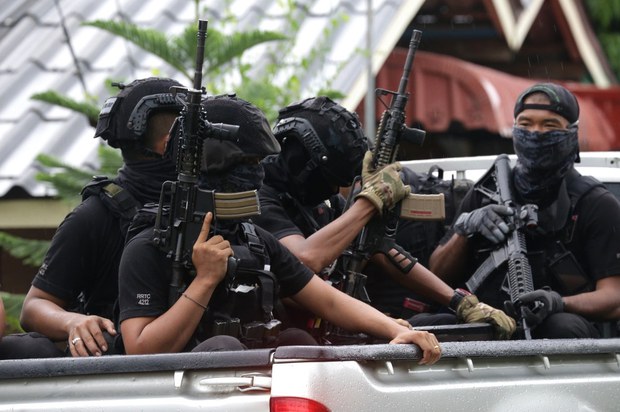Thai Deep South: Army Holding Woman for Questioning Over Deadly Raid
2020.07.08
Pattani, Thailand
 Government security forces move in to back up the pursuit for a small group of suspected insurgents after a deadly shootout in Pana-re, a district in southern Thailand’s Pattani province, July 3, 2020.
Government security forces move in to back up the pursuit for a small group of suspected insurgents after a deadly shootout in Pana-re, a district in southern Thailand’s Pattani province, July 3, 2020.
Updated at 2:52 p.m. ET on 2020-07-10
A human rights activist in the Thai Deep South called on the military Wednesday to release a woman who has been held for questioning since July 3 because she owns a house where a soldier and a suspected rebel were killed during a raid by security forces last week.
Arma Wani, 41, a widow and mother-of-four, has been confined to Fort Inkayuth Borihan, an army camp in Pattani province, and her brother-in-law, Yari Wansani, was also being held there after he was taken to the camp for questioning, according to the activist and information from the military.
“I see alternation in how the law is enforced … There should be leniency and she can stay out of the barracks and be put under surveillance,” Lamai Manakan, a member of a military-appointed committee to protect human rights in Thailand’s insurgency-wracked southern border region, told BenarNews.
Arma said that she owned the house in Pana-rae, a district of Pattani, where government security forces mounted the July 3 raid in search of insurgents who were believed to be hiding out inside, officials said. Authorities allege that the suspects opened fire on the raiding party, provoking a shootout that left one person dead on each side.
“We learned that the house belongs to Arma Wani, so we took her in for questioning,” Col. Somkid Kongkaeng, the commander of the 42nd Ranger Task Force, which conducted the raid, told reporters, indicating that Arma was being questioned over whether she knowingly sheltered insurgents.
Efforts by BenarNews on Wednesday to contact officials at the southern military command to get updated information about the status of Arma and Ibrohem’s custody were unsuccessful.
Previously, Lt. Gen. Pornsak Poolsawat, the army commander in southern Thailand, had threatened to punish anyone who sheltered or provided support to armed separatist insurgents.
According to another local human rights advocate, people who live in villages across the cluster of provinces and districts that make up the Deep South are vulnerable, sandwiched by pressure from both the rebels and the authorities.
“The commander said seriously that he will prosecute all who shelter the rebels, but my question is what about the innocent civilians who are trapped in the middle of the rebels and officials?” said Bussayamas Isdul, president of the Ban Boon Tem Center, a youth home in Yala province.
“The rebels tote guns, and officials wield laws. Therefore helpless, innocent, people have no choice but to either die or go to jail,” she told BenarNews. “Do we have other choices for them?”
Since Arma was taken in for questioning at the army camp, her children, who range from 4 to 15 years in age, have been staying at the home of her younger sister, Lamai said.
On Wednesday, Lamai visited the children at their aunt’s home.
“It is small and cramped for eight children and two adults,” said Lamai, who works on the staff of the Buddhist Network for Peace, a local NGO.
“We did not have a chance to talk much for the sake of the children’s peace of mind, but I told the aunt to contact us for urgent needs, and we coordinated with local leaders to follow up on the future judicial process,” Lamai said.
Lamai said she had contacted the interrogation center at the army camp to urge officials to take good care of Arma and her brother-in-law, as well as ensure that their human rights not be violated.
The interrogation center at Fort Inkayuth Borihan is notorious for alleged torture carried out against suspected insurgents.
In July 2019, Abdullah Esomuso, a suspect in custody, fell in a coma after a few hours of interrogation and died a month later at a local hospital. In late June 2020, a court in southern Thailand ruled that it would hold an inquest in November and December into the cause of Esomuso’s death, whose case has angered human rights groups.
More than 7,000 people have died in violence across Thailand’s mainly Muslim and Malay-speaking southern border region since the insurgency reignited in 2004.
CORRECTION: Arma Wani and Yari Wansani were misidentified in an earlier version of this report.







